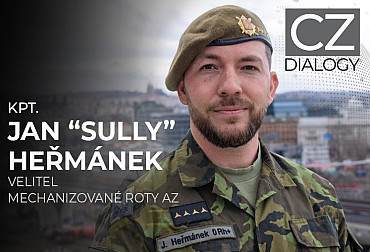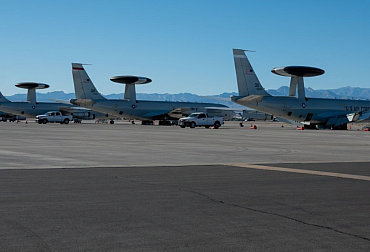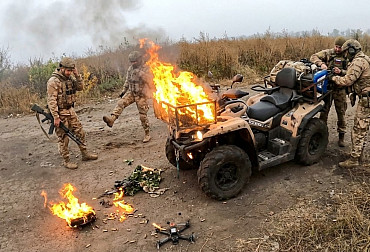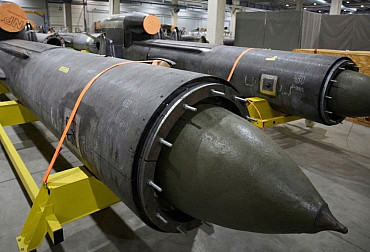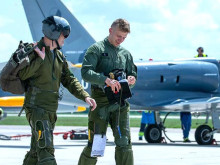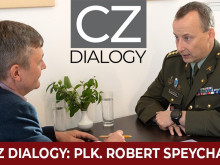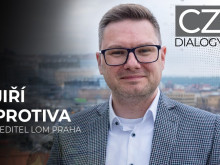Staff Sergeant Michal Baka: Adaptability to new technologies must be extremely fast
Since April of this year, Staff Sergeant Michal Baka has held the position of Chief Warrant Officer of the Czech Army Ground Forces. What is the role of senior warrant officers in the Czech Armed Forces, what are the current challenges they face, and what is the significance of building a non-commissioned officer corps? You will find answers to these and other questions in the next episode of our discussion program CZ DIALOGUES.
Video: Interview with Chief Warrant Officer Michal Baka of the Czech Army Ground Forces Command / CZ DEFENCE
What are the duties of a senior warrant officer in the ground forces, and what is the most important part of their service?
That's quite a difficult question to answer briefly. I'll try to describe it as best I can. A senior warrant officer is generally the commander's “libero,” who takes care of everything the commander needs at any given moment. The daily routine of a senior warrant officer in the ground forces is not exactly simple. There are mandatory tasks, such as attending meetings, and of course I am responsible to the commander for the individual training of all non-commissioned officers, warrant officers, and enlisted personnel in the ground forces. But of course, there are also personnel matters, whether it's nominations for career courses or the prevention of risky behavior. That's also part of the chief warrant officer's job. So to say that the job is simple or mechanical is definitely not the case. It's a diverse range of tasks that one performs. And related to that is also work for the system, for the development of the ground forces as a whole. Some kind of formula for how to develop the backbone of the army and build, move forward, go further. It's a diverse range of everything. It's not easy to answer what the main focus is. For me personally, the most important thing is to support the commander's intentions. When the commander wants to have trained ground forces, he deals with larger units. I try to contribute as much as possible through individual training, for which I am responsible.
Your position is certainly not solitary, but it will depend on how you work with other senior warrant officers and the team. Is that right?
Yes, because at the level of ground forces headquarters, you are quite far removed from people in basic positions. After all, there are many ranks between us. Personally, even though I have been in this position since April 1, I feel that with each passing month, I am further away from everyday life. I don't mean to say that I have lost touch or that I don't pay attention to what is going on below. But logically, the range of tasks is slightly different, and staying in touch with the people below is quite crucial and important. And for that, I use a system of leaders and senior warrant officers. Without that, it wouldn't even be possible.
The difference between an officer, a commander, and a senior warrant officer is precisely that you are tasked with carrying out or implementing the command's intentions.
Exactly. And for me, it's about making sure that subordinate commanders correctly understand the intentions of my commander, or rather the commander of the ground forces.
The role of the commander, whether of a platoon or a squad, is important. What qualities should such a commander have?
I think that any good book on leadership describes this better than I can. I will try to answer in a human way and based on my own experience. The most important quality of a commander in a professional army is to never be satisfied with the result and to have the right boundaries in place, so that I can keep pushing people forward, because then we are talking about professional burnout and so on. I am almost convinced that it is impossible to burn out professionally in the army, because when I look at the range of technologies, knowledge, and skills that a professional soldier must constantly deepen, it is unimaginable to someone like me that anyone would stop enjoying it. Training based on the attractiveness of the work is a top priority for me personally. Of course, if I go to shooting practice for five hours as part of a six-hour shift, stand in the wind and rain for fifty minutes waiting for my turn, then fire three shots and drive back again, that's not attractive training, or even training at all, it's just killing time. My commander, General Trojánek, and I have had quite a rich professional career together. I remember very well how, as commander of the 4th Rapid Deployment Brigade at the age of 51, he stood in front of the entire brigade and was the first soldier to pass the shooting test, and then no one could say anything. The commander did it, the star general did it, so let's all do it. I think that every person wants to win by nature, but few of us have the will to train. In my opinion, this is also one of the key qualities of a commander. In short, don't compromise on standards and know: I want to achieve this, and when I achieve it, I will find a way to move people forward again.
At the same time, empathy with people plays a big role for us today, because people are the most important thing for us, and even though this is a much-used phrase these days, for me personally it is not just a phrase. I myself now commute 360 kilometers to the unit where I serve. I know what consequences this has for my family, but again, when I combine this with the answer to the first question, it is necessary to communicate it properly, come home, and talk about these things. It will be this way and that way. The commander has set these conditions. The service will be like this. That way, everything will come together as a whole. Whether it's the character of the commander or empathy. I have been sitting in daily briefings for a relatively long part of my career and listening to: I would like to start a family, which is the reason why someone wants to move from point A to point B. And if the commander is set up correctly, he is able to seek dialogue. Okay. We have these tasks ahead of us, and I am able to let you go on this date. And the soldier will be able to take that information home and say: We can plan a family, I will be here for another six months, a year, a year and a half, and then I will be home. Let's plan our personal lives this way.
How has the empathetic approach in the army changed during your service?
A lot. I joined the army in 2005 with the first wave of professionals. I can see for myself that it is a long-term process. It is necessary to replace people in command positions. This also requires a lot of education, which was not always available to squad leaders with silver ranks, but things are moving forward, moving forward a lot. And we changed it. Some people might say, after twenty years, why can't it go faster? But I think that for a bureaucratic colossus like the Czech Army, those 20 years are a great achievement. I remember when I was at BMATT (British Military Advisory and Training Team) in 2011 and I was talking to the BMATT chief warrant officer about how we had implemented the position of chief warrant officers in the army since 2005, and he said, “Well, give it another 40 or 50 years and it will work for you.” Today, I know what he meant. A lot has changed, and it's a testament to the fact that the army has become more professional and no longer has the same approach it once did.
Technological development is very visible in the army. Has this changed the approach to the professional development of non-commissioned officers?
Definitely. Adaptability to new technologies is essential and is now a common part of military life. One example I can give is the modular combat suit that was introduced to the ground forces or the 4th Rapid Deployment Brigade of the 43rd Airborne Regiment. These are technologies that appear in the office or in equipment from one day to the next. And what about that? Of course, if you don't do anything, you don't break anything, but when you're training on something, things get broken here and there. It's not exactly popular when you break or destroy new technology right away, but progress is moving forward, and without adaptability to new technologies, we wouldn't even be able to function on the battlefield today. Or night vision devices. I remember that before 2010, there were three night vision devices on rifles, MEO 50S on submachine guns, and that was all. Today, every member of a mechanized squad has night vision equipment in some form or a thermal imaging camera. To this day, we are still explaining the difference between night vision equipment, which works by amplifying residual light, and thermal imaging cameras. Thermal imaging cameras work during the day as well as at night, and so on. Technology is now a common part of military life, and adaptability to it must be lightning fast, because time is the most valuable commodity. Today, there is not even time for training. If I take the example of my generation's global war on terrorism and the issue of IEDs, by the time we finally adapted and found some countermeasures, the other side had moved on again within a month or two. So adaptability to new technologies in the military must be lightning fast, and that really moves us forward.
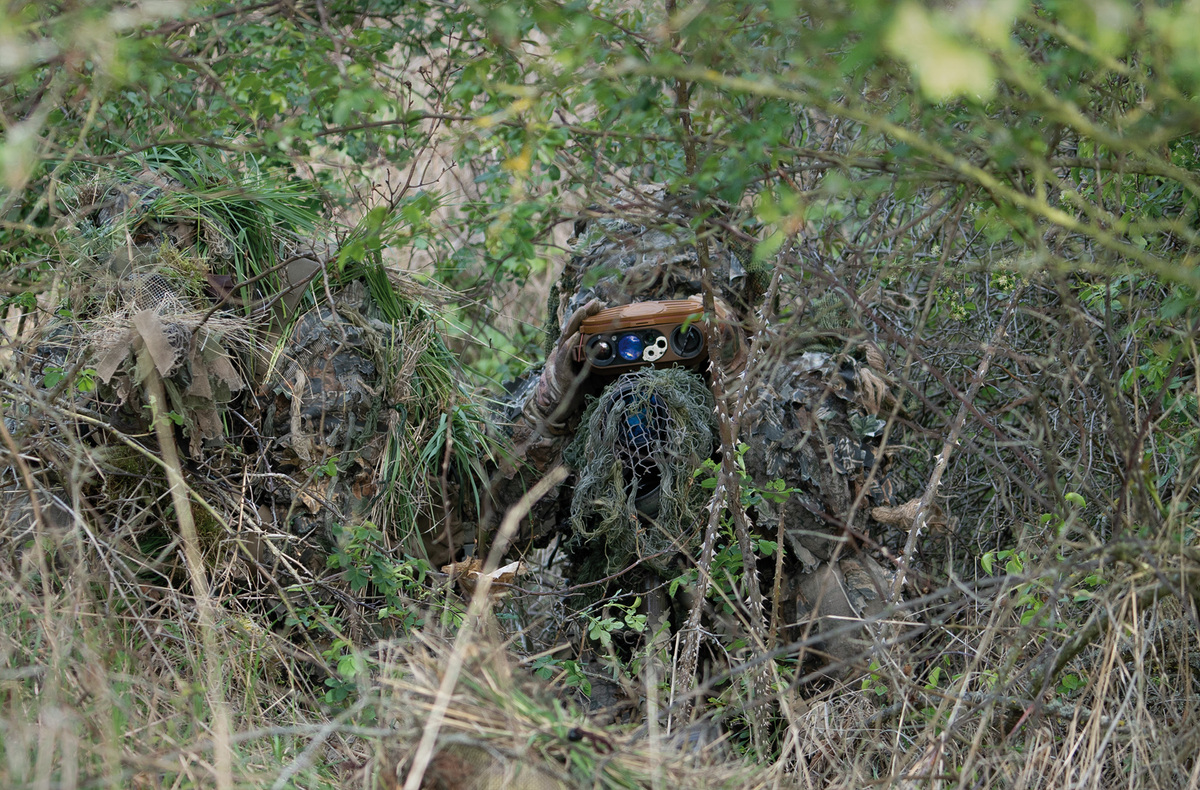
The ability of soldiers to quickly resolve situations and adapt to new technologies are precisely the goals of the St. Wenceslas Cup competition, of which you are the main organizer.
It is certainly one of the fundamental pillars on which the St. Wenceslas Cup is based. That adaptability, whether to weapon systems or technology. This year, we used a modular combat suit. For example, soldiers cleaning trenches suddenly had a drone above them and access to the drone's output so they wouldn't get lost in the trenches. Adaptability is there, and everyone deals with it differently, but it's fundamental for us. As we are building something that has no parallel, at least in Europe, it would not be possible without adaptability. And for me, it's very nice to see that 80 to 90 percent of the teams already have adaptability more or less in their blood.
How much do you think the fact that a drone is flying overhead affects a soldier's psyche?
Paradoxically, drones have been flying overhead for the last 20 years, but they were so high up that people didn't notice them. Today, when you hear that buzzing sound, it's really something else and it's not a very pleasant feeling. When we were preparing the competition, we wanted to involve drones as much as possible, which we didn't quite manage to do due to the weather conditions at the time.
The St. Wenceslas Cup is now a major international and interdepartmental shooting competition. How successful are the tasks that are trained and competed there in returning to the army?
We were never interested in the competition itself, we were interested in showing how training can be done differently and attractively. This year, 58 teams and almost 120 shooters took part, and the organizing team was almost as large, with 150 people. It's great that we've managed to get to this point, where the person who prepared the stages and the person who shot them meet at the unit, because the competition complies fully with current legislation and military regulations for conducting training, but suddenly the training looks completely different. This competition has had a huge impact on training. Soldiers discover that they can shoot with night vision equipment during the day just as if they were shooting at night, and they don't have to wait for nighttime. Suddenly, they realize that the aiming point of their weapons can work a little differently. Soldiers have expanded their knowledge and skills so that they can build and conduct training differently.
How did our teams fare against foreign teams?
Very well. We had five teams from England, five teams from France, and two teams from Kenya. And when people from five English teams tell you that they've never seen anything like this before, and five French teams confirm it, it's a sign that we're doing something right. And my own personal opinion is that when it comes to shooting training, the Czech Army has a wealth of know-how, and perhaps not everyone in the world knows that. From my own experience, few armies, when I talk about large conventional armies, are at the same level as our army in terms of shooting training. And this is a great opportunity to compare ourselves. Since the St. Wenceslas Cup began, although I have now mentioned England, France, and Kenya, we have also had teams from Germany and Latvia, and the range of international participation is broader, whether to the west or east of us within NATO partners. And it is heartwarming for the entire organizing team that the competition is so highly regarded by international participants.
You mentioned the participation of two teams from Kenya. How are Kenyan soldiers different from European ones?
Let's just say that the mindset is simply different. It is logically a different culture. For me, as someone who observed this from a distance, it's great that even though these guys had a different mindset, in the end everything came together, and you can see that if the spirit of a warrior, as I call it, is set right, it doesn't really matter which part of the world he's from, it will always work the same on the battlefield.
Seen through the lens of the St. Wenceslas Cup, are the soldiers of the Czech Army ready for active deployment on the eastern flank, if necessary?
If it were up to me, I would definitely say yes with a clear conscience. On the other hand, I must add that as a senior warrant officer in the ground forces, I am fully aware that even if we had all the time in the world and drilled and honed everything down to the smallest detail, I still have to say that a few extra days, years, or months would be useful. And I feel that a professional soldier is never ready.
The topic of recruitment has been discussed for a long time. What can be done to ensure that young soldiers who are now joining the army stay in it for as long as possible?
I think open communication is important. If we just beat around the bush, make promises, and no one sees anything, we will lose trust. We know that trust takes years to build, but it can be lost in a second, and we as an army must adapt to those who join us today. I don't think this is anything new, just as the generation before us had to adapt when a new generation of soldiers came along. But the way we look at things and the way we look at service has changed, that's a fact. It's important to communicate openly. To say: Look, we're doing everything we can to get backpacks, for example. But we're at the end of the chain. We don't sew those backpacks, we don't do the job, we just contribute to it somehow. That's how the system is set up. And when that person knows that his commanders did everything they could, that we cleared the way, but no one expected this and that to happen, that orders would be canceled or materials would be unavailable. Communicate it correctly and openly. We did our best, but it wasn't enough. We learned our lesson. Next time, we'll take that proverbial extra step to catch what “got us” today. That's how I think we need to communicate openly. This and that was done, and let's move on.
Is there anything specific you would do differently when it comes to recruiting soldiers for the army?
I don't know if I would do things differently. Although I know that every soldier is a recruiter in their own way. Actually, I'll go back to what I said earlier: it's about the character of the soldier, the commander, communication, and openness. Who knows today what goes on behind the barracks gates? If I ask you to name five TV series about the police, everyone will say everything from Cases of the 1st Department to Criminal Investigation Department Anděl and Police Modrava, and I don't know what else, it just pours out of us.
But then again, we have Boys and Men, What Kind of Soldier Is That...
But that's not really a reflection of the life of a soldier in the barracks today. And I think we're missing that a little bit, that openness. To say that the army isn't just what you see in movies or computer games. It's about the fact that there has to be some order, some discipline, for us to function. When I put on my uniform, I knew what I was getting into. But we have voluntary military training, and after three and a half weeks of training, the high school students who come to us are surprised that this is the life of a soldier. They find some kind of work schedule, the class schedule is just transformed into a work schedule. But the teaching, preparation, education, upbringing, training, as we call it in the army, just continues. And if you don't have anyone from the army in your immediate vicinity, you don't have this information.
You mentioned order and system. Is today's younger generation further away from them than you were when you joined the army?
I don't think they are further away from it than I was when I joined the army. Definitely not. They just need a different way to understand why. Last year, when I was still a senior warrant officer in the 4th Rapid Deployment Brigade, I actively participated in voluntary military training. When we explained the reason to people, they were able to push themselves to overcome their limitations or to fulfill tasks, in order and discipline, just like any other generation that has been here. And I believe that when you were young, the older generation looked at you in exactly the same way that we look at you here today. But we have also changed. That's adaptability. We have adapted to get the job done. And whether it's on the battlefield or telling the younger generation, “Look, we're going to do this for this reason because we need to achieve these goals,” they can push themselves just as hard—they just need the information to be presented to them differently.
When I was young, nobody really talked to us much.
Yes, that's how it was, and we accepted it. I grew up in the army under exactly the same conditions. I was given a task, I went to do it, I didn't ask questions. I don't think it's wrong that people today want to know the reason. Take artificial intelligence, for example. If we look at education today, how it has changed. I spent the whole weekend reading four books to write a report on Napoleon for history class. Today, it's a matter of opening your smartphone, clicking three times or even less, and it does it all by itself. But that's just the way it is, and the fact that someone needs to know the reason is great. For me, it's the least of it. After all, when you look at the 5 Ws, as they say in the army, there's the question of why I'm going to do it. It's just good to realize that you need to say it more.
We have already touched on the topic of the attractiveness of working in the army. Has the system of training soldiers and officers changed in any way due to modern influences?
Definitely yes. Modern technology, whether it be various simulators, laser shooting ranges, injury trainers, all of this takes the training system to a whole new level, including its attractiveness and, above all, its financial aspect. When I need to train the crew of combat vehicles in firing anti-tank guided missiles, each of which costs between four and eight million crowns, it's not exactly a matter of driving to the shooting range and firing ten of them a day with one crew. Let's talk about the fact that we have 52 vehicles in the battalion. Training is not entirely feasible from an economic point of view without simulators. Even an Olympic athlete, when preparing for the Olympics, phases their form so that they peak and then, logically, it starts to decline. We are talking about wanting to have 37,500 soldiers. Now we are discussing what condition those people will be in. It is also about the fact that simulators and technology help us keep people ready much better and faster. At a time when the ground forces alone have over thirty battalions, but we have three training areas where we would need to rotate thirty battalions, it is in a way unrealistic to have someone there every week to shoot and fulfill everything we want. Technology helps enormously in this regard. And at the same time, there is also the attractiveness factor.
Since we mentioned shooting competitions, if I take shooting training, where you have so-called weapon training, which is training in handling weapons, without live fire, then go somewhere in the hallway and handle the weapon for two hours. That won't be much fun for anyone. But the moment you give the person a laser trainer, they can shoot at a target, and the training is completely different. Then you can evaluate the whole thing. You open an app on your phone and show the person everything they do with the weapon. For me, that's a step forward, because even those people see feedback, which is also important.
Has the war in Ukraine changed the way the army is prepared and trained?
I don't think it has changed the way, quite the contrary. Let's say it has breathed new life into it. I mentioned the war on terror, and I would add the deployments in Afghanistan and Iraq – that was the driving force at the time. For soldiers deployed in foreign operations, it made sense, it gave them a goal, it motivated them to constantly improve their own abilities and skills. And the war in Ukraine suddenly seemed like a warning finger, telling them not to rest on their laurels. But I don't think it changed the way they were trained. Rather, we have started to reopen the adaptability drawers. If today's battlefield is overwhelmed with thermal imaging, then suddenly the common individual ability of camouflage must be trained in every soldier so that they think about how to camouflage themselves not only from the naked eye of an observer through some optics, but also from thermal imaging and night vision devices. Suddenly, camouflage takes on a whole new dimension in training. The war in Ukraine has shown that the basic skills of an infantryman, as defined in the army, still make sense and are not outdated, but must be viewed through a modern lens.
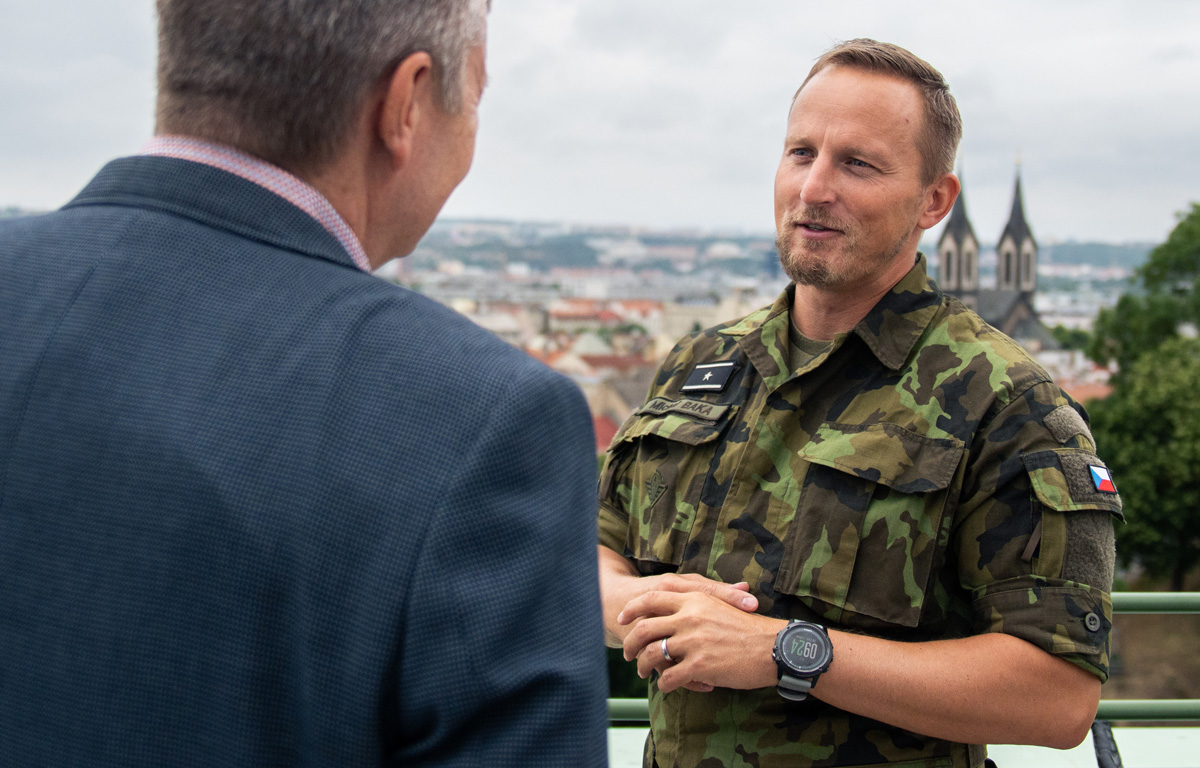
The Czech Army is gradually modernizing, including changes in technology. Is there anything you would like to see in the ground forces as soon as possible?
As the chief warrant officer of the ground forces and the person responsible for the individual readiness of personnel, even though we are talking about modern technologies, equipment, and armaments, it would be good to have an individual package so that every soldier has what they need to be able to operate on the battlefield. So that they have the means to camouflage themselves, for example against thermal imaging, so that they have the possibility of fused battlefield observation, both with night vision and thermal imaging. I know we are purchasing them. I know we will be supplying them. I know we have them, but I definitely think that this is what will move us forward and help us get to the level on the battlefield as quickly as possible, so that even as a numerically small army, we will be able to stand up to much stronger forces based on our technological superiority. Logically, we will never have hundreds of thousands of soldiers, but if we need to face a threat, it is technology that helps us to confront it and replace quantity with quality. Logically, quality must come with training, and I think that if every member of the ground forces had binocular night vision devices that also worked in conjunction with thermal imaging, that would be a dream come true for me. When I can see and observe the battlefield, I am able to respond to all threats. When I cannot see and do not know what situation is in front of me, I am unable to deal with it.
What is your vision for the development of warrant officers, non-commissioned officers, and enlisted personnel in the Czech Armed Forces?
My vision is to find a convergence of three spheres among our people: preparation—education, training, and instruction—in the three pillars. This is an institutional pillar in the concept of the Czech Armed Forces, the Training Command-Military Academy in Vyškov, where we have a warrant officer school with career courses designed to ensure that soldiers gain a comprehensive overview of the armed forces some amount of information so that they are able to cope with the system of a large army as such, so that they know what our headquarters are like, so that they know what laws apply to professional soldiers, and so on. And then we have operational training, which is training at the unit. But logically, if I am a squad leader but I don't know what my combat vehicle can do and I don't learn it in Vyškov, how can I carry out that training? And, of course, the third pillar is self-development. It's basically in the name: service relationship. A professional soldier has a service relationship, not an employment relationship. Self-development and self-education are just as important to me as the operational training part of preparing people.
If we waited for the large army system to write a manual on the use of thermal imaging, I would be waiting forever. But today we have the internet, open sources, and partner sources. We have many of our people within NATO at various headquarters, and we also have headquarters for gaining experience or utilizing experience from Ukraine, where one can obtain information relatively quickly and disseminate it further so that training can be changed and adaptability can be a continuous process. I can't think that I'll be a good soldier if I lack self-development and self-education. And that can take any form, whether it's going to the gym after work or reading a book. When I was going to Afghanistan, we read books that had already been written at the time so that we knew what we were getting into. At the same time, as the chief warrant officer of the ground forces, I want to communicate with the chief warrant officer of the Training Command-Military Academy about the structure of the warrant officer school, actively attend the warrant officer school, and lecture at the career courses we have there. I want to actively participate in this.











